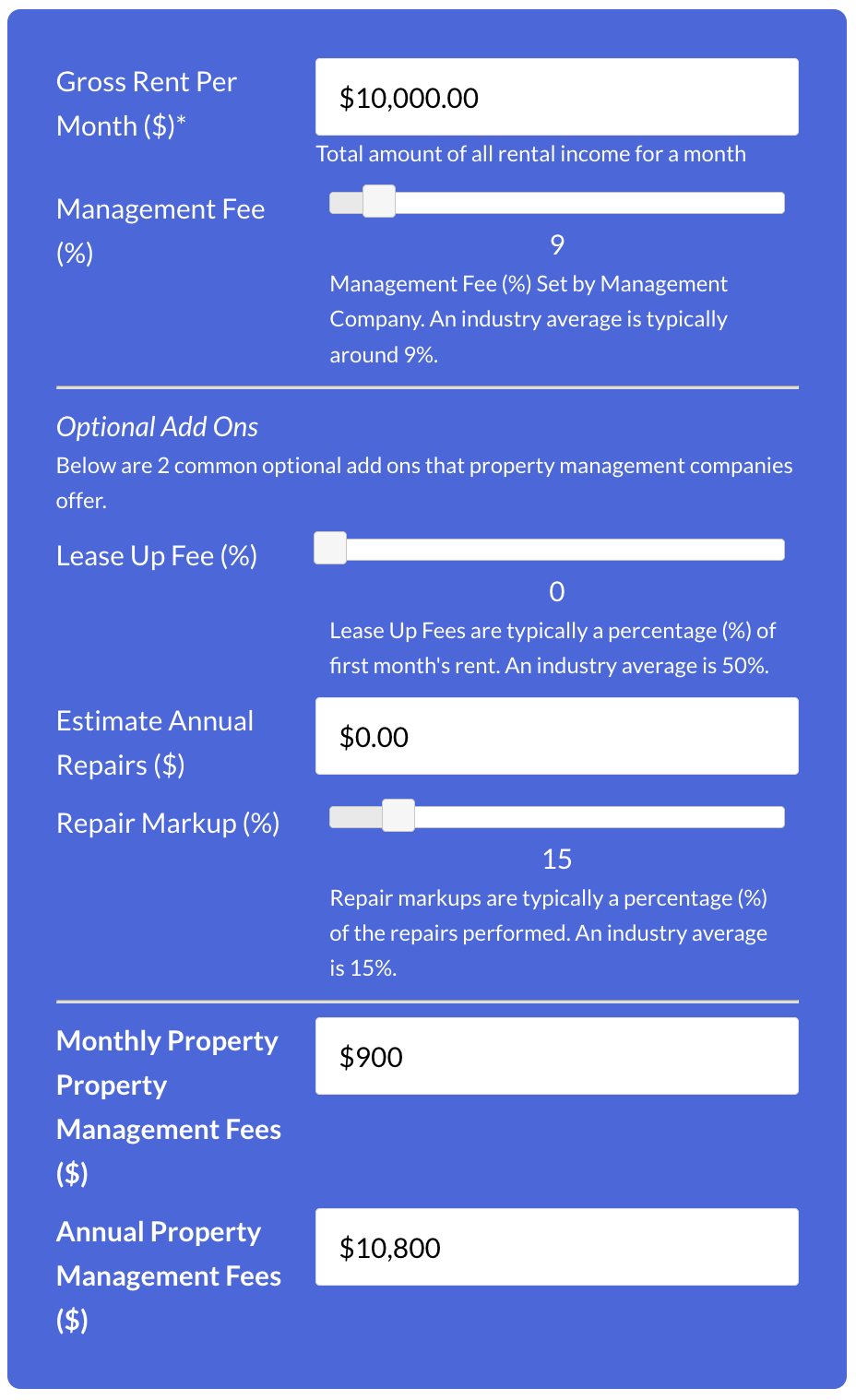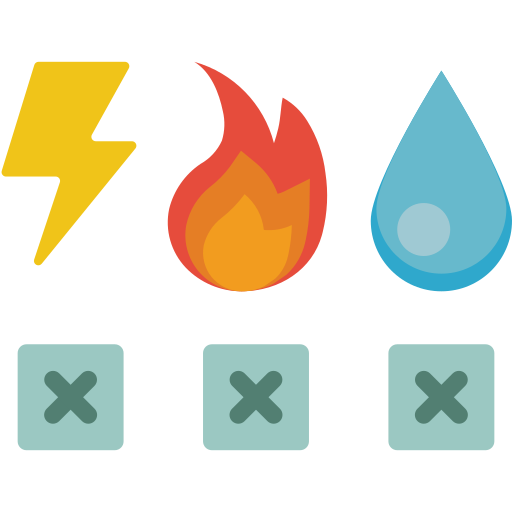Last Updated: April 2024

In the world of managing rental properties, property management companies deliver services to property owners depending on their preferences. From full service management, to partial service management, property management companies can provide full oversight of a property’s operations or only limited components. Below we take a deep look at the full picture of property management services.
Top 20 List of Most Common Property Management Services
The vast scope of services offered in property management requires property managers to wear many hats. While some duties vary by property type (e.g. Single Family Rental Homes vs Commercial Hospitality Properties) there are many duties that are common among all property managers. Below is a list of some of the most common services offered by property management companies:
1. Tenant Relations
Dealing with a tenant can be an enjoyable experience when they are paying you thousands of dollars in rent every month. Conversely, dealing with that same tenant when they are calling you at 2AM on a Sunday morning to deal with an overflowing toilet is not such an enjoyable experience. Dealing with tenants (i.e. tenant relations) is one of the primary motivators for rental property investors to hire a property management company. Property management companies will take all calls from tenants and address their concerns. New innovations such as property management answering services have even arisen to address this pain point for rental property owners.
2. Rent Collection and Accounting
Rent is due on the first of every month. Collecting rent and keeping record of all deposits, is a never ending and fundamental service provided by property management firms. Pursuing late rent and applying late fees are other more tedious tasks tied to the rent collection process. A majority of larger property management companies are turning to real estate software solutions for rent collection and tenant account management. Many of these programs allow for tenants to pay online via ACH, view account charges (such as RUBS or late fees), and monitor their ledgers to track account balances.
3. Marketing and Advertising
Often one of the strongest value propositions of a property management company is their leasing and marketing capabilities. Since vacant units are a drain on a property’s cash flow, minimizing vacancies with qualified tenants as quickly as possible is a very important role in the overall rental property process. Property management companies often utilize comprehensive marketing programs that include listing the vacancy online on a website such as Apartments.com, Loopnet, or other online vacancy listing websites, as well as hosting open houses and property tours, and installing prominent leasing signage to catch drive-by prospects.
4. Interview Tenants & Check Credit Profiles

Along with the aforementioned marketing efforts, property managers or leasing agents will handle application processing, ordering credit reports and checking references, and ultimately facilitating a signed lease agreement. Checking prospective tenant’s creditworthiness is often done with third party tenant screening softwares.
5. Lease Preparation and Renewal
This service entails negotiating, drafting, reviewing, and updating lease agreements to ensure they are legally compliant and tailored to the needs of both the property owner and tenant. It requires an understanding of local regulations and regularly reviewing terms upon renewal to reflect any changes in the tenant’s situation, market conditions, or property specifications. A good property manager will negotiate terms that protect the property owner’s interests while maintaining a fair and transparent relationship with the tenant.
6. Tenant Onboarding and Offboarding
As tenants come and go from a property, they will need to be onboarded and offboarded. Onboarding involves the process of welcoming and orienting new tenants by providing essential property information, setting up utilities, and ensuring a smooth move-in experience. Offboarding entails the process of closing out vacating tenants via property inspections, managing security deposit returns, and ensuring the property is prepared for subsequent occupants.
7. Financial Reporting & Budgeting
Keeping record of income and expenses (i.e. receivables and payables), and generating ongoing financial reports such as Profit and Loss reports (i.e. P&L) for property owners are cornerstone services provided by management firms. Property management companies also deliver value by performing financial planning such as creating budgets to ensure that properties remain adequately maintained and profitable. Part of this planning requires performing market rent analyses, which are analyses of comparable market rents, changes in area demographics, and anticipated vacancy rates.
8. Market and Rent Analysis
Performing detailed assessments of the local rental market, evaluating trends, demand, and prevailing pricing to determine the most competitive rent for a property. By comparing similar properties and monitoring shifts in the market, property managers can set and adjust rental rates that attract potential tenants while maximizing returns for property owners. Furthermore, such informed pricing decisions directly address vacancy management by ensuring the property remains appealing and competitively positioned in the market.
9. Inspecting Property Conditions
Ensuring that rental units remain safe for residents over time, is an essential task for property managers. As a fundamental property management service, they should inspect all areas on a regular basis in order to identify any issues that need immediate attention (e.g., plumbing problems) or other necessary improvements (e.g., painting). Additionally, they should also record any photos/videos taken during these inspections as evidence if needed later down the line in legal proceedings against tenants who may be violating their lease agreements.
10. Grounds Keeping
When it comes to the upkeep of a property’s outdoor areas, keeping common areas such as lawns, gardens, walkways, and other communal spaces tidy is a simple but important service. Tasks might encompass lawn mowing, landscaping, snow removal, litter cleanup, and periodic inspections to identify potential hazards or areas for improvement. By ensuring a well-maintained exterior, groundskeeping not only elevates the property’s aesthetic appeal but also contributes to a safer and more enjoyable environment for tenants and visitors alike.
11. Maintenance and Repairs

Maintenance issues are an unavoidable part of rental property management. Property management companies field all maintenance requests directly from tenants and then coordinate repairs with respective property maintenance technicians. Furthermore, property managers monitor maintenance cost reporting and plan for preventative maintenance as needed; among also overseeing contracted work such as building improvements jobs.
12. Vacancy Unit-Turning
In addition to handling maintenance jobs, management companies can also handle “unit turnovers” which becomes a more frequent occurrence as the number of units grows larger. As the name implies, “unit turning” is the process of taking a recently vacated rental property unit and preparing it for the next tenant. The process can be as simple as applying a fresh coat of paint to the unit, or require a full remodel.
13. Vendor Management
Rental properties employ third-party vendors for countless types of services – landscaping, window washing, plumbing repairs, etc. Keeping track of these vendors is surprisingly a demanding job. Each vendor should always be hired based on a contract, whereas the terms need to be negotiated before work is performed. Performing the service then needs to be coordinated with tenants, with the goal to minimize tenant disruption. Lastly, upon successful performance of the service, the vendor needs to be paid.
14. Property Improvement Projects
Well maintained properties are easy to command higher rents and retain quality tenants. In order to maintain these properties, improvements must be a regular part of the operational plan. Projects usually require significant effort to start and see through completion. From first getting multiple competitive bids for the work and building materials, to ensuring minimal disruption to tenants while the job is ongoing, overseeing property improvement projects is a thorough and lengthy process.
15. Utility Management
Many new landlords are surprised at how costly utility bills can be for a multi-unit rental property. Property managers understand this and carefully oversee all utilities associated with a property, from electricity and water to gas and waste disposal. Property managers may handle the setup, transfer, or discontinuation of these services during tenant transitions, and can also monitor usage to ensure efficient consumption and accurate billing. By effectively managing utilities, property managers ensure seamless services for tenants, potential cost savings for property owners, and reduced environmental impact.
16. Enforce Property Rules Among Tenants
From a noisy apartment tenant, to an incorrectly parked commercial property tenant; property rules are often broken and need to be enforced. Property management companies are usually the first point of contact when issues arise and also the ones in charge of ensuring that the issue is resolved. Both property owners and tenants rely on property managers to be the settlor of tenant disputes.
17. Legal Proceedings
Unfortunately not all tenants are going to play by the rules. In the case of non-payment of rent, property management companies can assist with seeing through the often arduous eviction process (e.g. Posting the 3-Day Notice to Pay Rent or Quit). In the occasional event of a tenant abandoning a rental unit before the lease term expires, property management companies can assist with the legal filings to pursue any financial damages.
18. Evictions
The process of an eviction can be very procedural and time consuming. Property managers must navigate this procedure in strict adherence to local and state laws, ensuring that all notifications, documentation, and actions are carried out correctly and fairly. Handling rental property evictions with professionalism and sensitivity minimizes potential conflicts, legal challenges, and ensures the property can be promptly prepared for future occupants.
19. Compliance Tracking
Many years ago, owning and managing rental properties was as simple as putting a “For Rent” sign up outside and collecting some cash every month. Times have changed significantly and rental property owners are becoming increasingly subject to new rules to comply with. From local business licenses, to routine property fire & life safety system inspections of commercial properties, the responsibility to remain compliant is ultimately the property owner. However, skilled property management companies in your area should be familiar and helpful to comply with the nuanced local laws required for your rental property.
20. 24/7 Emergency Response
As one of the most valuable offerings provided by property managers, this service ensures that tenants have access to immediate assistance in case of unforeseen incidents or urgent issues related to the property, regardless of the hour. Whether facing a sudden plumbing leak, a power outage, or a security concern, a dedicated helpline or contact mechanism is available around the clock. Such a responsive system not only safeguards the property from potential damage but also instills a sense of safety and trust among the tenants, underscoring the property manager’s commitment to their well-being.
The #1 Rental Property Newsletter
Once a month, we send out an exclusive Rental Property Market Update with top stories, current mortgage rates, building products, and more. No spam and unsubscribe anytime.

What are Property Management Services?

Property management services are all of the duties executed by property managers to successfully operate a rental property without involving the owner.
Try Our
Property Management
Fee Calculator →
100% Free – No Sign Up Required
Property Management Services FAQ
How do Property Management Companies Charge for Services?

Property management fees vary based on factors such as the type of property, location, size, and the range of services required. Some companies may include all services for one monthly payment, while others may bill each service separately. The average property management fee for a rental property is approximately 9% and falls between 6% – 12% of gross rent collected.
Can a Property Management Company Help With Acquisitions and Sales?

Yes, a property management company can potentially help with property investment related services (if offered). Their experience can provide valuable insights on market trends and identify suitable properties based on the investor’s goals and criteria. Additionally, property managers can assist with due diligence, negotiation, and acquisition processes, leveraging their local expertise and industry connections. If they do not directly offer these services, they can typically recommend local professionals who can help.
Search Rental Real Estate
Try searching out site for hundreds of rental property topics ranging from property management, investor tool reviews, investment research, and more.
Differences Between Commercial and Residential Property Management Services
Commercial and residential property management services both involve overseeing and maintaining properties on behalf of their owners, but they differ in the specific services they provide. The unique needs and requirements of each property type lead to differences in the services offered by residential and commercial property management companies.
| Property Management Services | Commercial Property Management | Residential Property Management |
|---|---|---|
| Leases | Typically longer term leases (3-10 years), triple net leases, etc. | Typically shorter term leases (6-12 months), gross leases, etc. |
| Tenant Screening | Focus on financial stability of the company, business reputation, industry, and use of the space. | Emphasis on individual personal financial profile including credit score and employment. |
| Maintenance and Repairs | Typically includes maintenance of common areas, exterior maintenance and specialized systems such as HVAC or elevators. | Primarily focuses on interior and exterior maintenance, and repairs within individual units. |
| Rent Collection and Financial Management | Common Area Maintenance (CAM) charges, annual rent escalations, and reconciliation of property expenses. | Monthly rent collection, late fees, and security deposit management. |
| Legal Compliance | Compliance with commercial zoning, building codes, ADA regulations, and environmental regulations. | Ongoing adherence to local, state, federal housing laws, landlord-tenant laws, and fair housing regulations. |
| Marketing and Advertising | Targeted marketing strategies for specific industries and/or business usually through a commercial real estate broker. | Focus on online residential rental listing platforms and physical signage on the property. |
| Tenant Relations and Retention | Building mutually prosperous relationships with business tenants and addressing specific commercial needs | Fostering positive relationships with tenants while maintaining property rules and responding to maintenance requests and property concerns |
More Property Management Guides
About the Author

Ryan Nelson
I’m an investor, real estate developer, and property manager with hands-on experience in all types of real estate from single family homes up to hundreds of thousands of square feet of commercial real estate. RentalRealEstate is my mission to create the ultimate real estate investor platform for expert resources, reviews and tools. Learn more about my story.
Disclaimer: The information provided on this website does not, and is not intended to, constitute legal and/or financial advice. As such, all information, content, and materials available on this site are for general informational purposes only. Please review our Editorial Standards for more info.










